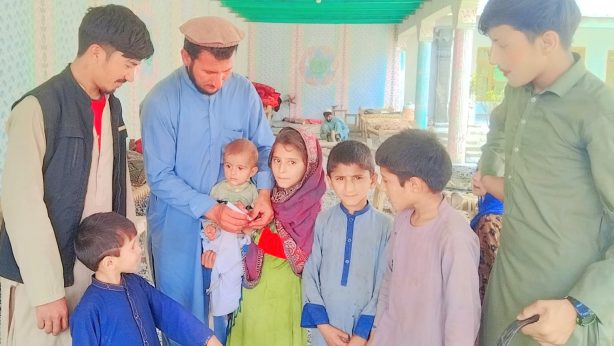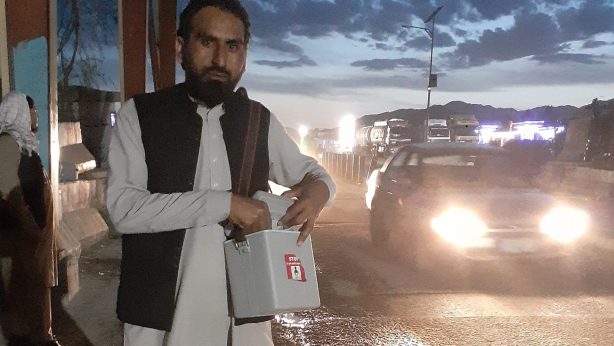Polio has forced Abdul Basir to beg

Marzia Frotan
Herat, Afghanistan – Abdul Basir sits in a wheelchair on the roadside of Herat city, where his 10-year-old daughter carries him from one location to another.
He, who is 40 years of age, contracted polio at the tender age of one, leaving one of his legs permanently paralyzed.
Abdul Basir, a father of six children, has a twelve-year-old daughter as his eldest and a six-month-old son as his youngest child.
His family lives in a rented house in the remote area of Shalbafan, located in the southern part of Herat city.
Every day, Abdul Basir commutes from his home to Herat City in a wheelchair, with the help of his 10-year-old daughter. He says that the round trip takes nearly four hours.
He says he wasn’t vaccinated during childhood due to the lack of vaccines.
 Abdul Basir, unable to work due to his disability, is forced to beg in order to support his family. Every day, he sits in a wheelchair by the roadside, hoping for assistance from passersby © Polio-free Afghanistan/2024/ Marzia Frotan
Abdul Basir, unable to work due to his disability, is forced to beg in order to support his family. Every day, he sits in a wheelchair by the roadside, hoping for assistance from passersby © Polio-free Afghanistan/2024/ Marzia Frotan
“When I was a child, my family lived in the Kushki Kuhna district of Herat. At that time, there were no polio vaccination campaigns, and my family did not vaccinate me,” he added.
Speaking of his difficult life, Abdul Basir remarked, “I contracted polio at the age of one due to not being vaccinated, and since then, I’ve never been able to walk.”
The hardships of poverty and hunger
Abdul Basir, unable to work due to his disability, is forced to beg in order to support his family. Every day, he sits in a wheelchair by the roadside, hoping for assistance from passersby.
According to him, when no one extends a helping hand to him, he is forced to fast on bread and tea.
“Sometimes, people give me bread or food. I take them home and eat with my family members. However, when no one extends a helping hand, we find ourselves with nothing to eat, and are forced to sleep hungry, alongside our children,” he shared.
This disabled person explains that when he eats bread and tea during Sahari, he experiences severe hunger throughout the day; not only is it difficult for him, but the entire family struggles to fast without proper food.
Abdul Basir expressed that if he were not disabled, he could have led a better life and would not have been forced to beg others for food to support his family.
Vaccination is the only way of protection against polio
Abdul Basir has three children under the age of five. And during every polio vaccination campaign, the sole focus of this disabled father is to ensure the vaccination of his children.
He stated that due to his fear of polio, he ensures that his children receive vaccinations during each vaccination campaign
“If for any reason my children aren’t vaccinated, I take them to the clinic and ensure their vaccination,” he emphasized.
Abdul Basir urges all families to vaccinate all their children under the age of five. He warned that if parents neglect this responsibility, their children could become infected with polio and end up disabled like him.
He states that if his parents had vaccinated him during his childhood, he would have had a good and healthy life.
In a poverty-stricken society like Afghanistan, where even healthy individuals endure economic hardships, the lives of disabled people become exceedingly challenging.
Social activist Sayed Ashraf asserts that there are thousands of disabled individuals across all parts of Afghanistan who are living in dire conditions and have been completely forgotten.
He further stated, “In addition to men, women also suffer from polio-related disabilities and endure extreme hardship. Unfortunately, these women are also denied several basic human rights.”
According to him, in the current situation where poverty and economic problems have reached their peak, the lives of the disabled have become increasingly challenging, and the laws designed for them are not being implemented at all.
According to Sadat, nationwide polio eradication campaigns should be conducted in order to safeguard Afghanistan’s next generation, so that they are not left out of vaccination.
While the precise number of disabled individuals in Herat remains unknown, it is evident that numerous people in both the city and surrounding districts grapple with the challenges posed by polio-related disabilities.


